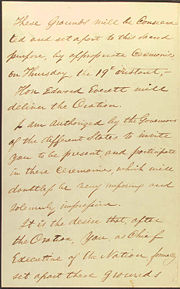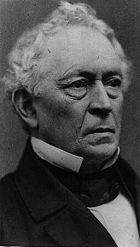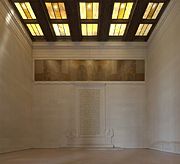Gettysburg Address
2008/9 Schools Wikipedia Selection. Related subjects: North American History
| Gettysburg Address | |
| Created | November 19, 1863 |
| Location | Several copies at various places |
| Authors | Abraham Lincoln |
| Purpose | To redefine the purpose of the Union in fighting the Civil War |
The Gettysburg Address is the most famous speech by U.S. President Abraham Lincoln and one of the most quoted speeches in United States history. It was delivered at the dedication of the Soldiers' National Cemetery in Gettysburg, Pennsylvania, on the afternoon of Thursday, November 19, 1863, during the American Civil War, four and a half months after the Union armies defeated those of the Confederacy at the decisive Battle of Gettysburg.
Abraham Lincoln's carefully crafted address, secondary to other presentations that day, came to be regarded as one of the greatest speeches in American history. In just over two minutes, Lincoln invoked the principles of human equality espoused by the Declaration of Independence and redefined the Civil War as a struggle not merely for the Union, but as "a new birth of freedom" that would bring true equality to all of its citizens, and that would also create a unified nation in which states' rights were no longer dominant.
Beginning with the now-iconic phrase "Four score and seven years ago...", Lincoln referred to the events of the Civil War and described the ceremony at Gettysburg as an opportunity not only to dedicate the grounds of a cemetery, but also to consecrate the living in the struggle to ensure that "government of the people, by the people, for the people, shall not perish from the earth".
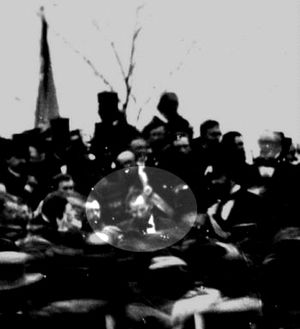
Despite the speech's prominent place in the history and popular culture of the United States, the exact wording of the speech is disputed. The five known manuscripts of the Gettysburg Address differ in a number of details and also differ from contemporary newspaper reprints of the speech.
Background
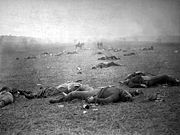
From July 1–3, 1863, more than 160,000 American soldiers clashed in the Battle of Gettysburg, in what would prove to be both a turning point of the Civil War and one of its bloodiest battles. The battle also had a major impact on the town of Gettysburg, Pennsylvania, which numbered only 2,400 inhabitants. The battlefield contained the bodies of more than 7,500 dead soldiers and several thousand horses of the Union's Army of the Potomac and the Confederacy's Army of Northern Virginia, and the stench of rotting bodies in the humid July air was overpowering.
Interring the dead in a dignified and orderly manner became a high priority for the few thousand residents of Gettysburg. Initially, the town planned to buy land for a cemetery and then ask the families of the dead to pay for their burial. However, David Wills, a wealthy 32-year-old attorney, objected to this idea and wrote to the Governor of Pennsylvania, Andrew Gregg Curtin, suggesting instead a National Cemetery to be funded by the states. Wills was authorized to purchase 17 acres (69,000 m²) for a cemetery to honour those lost in the summer's battle, paying $2,475.87 for the land.
Wills originally planned to dedicate this new cemetery on Wednesday, October 23, and invited Edward Everett, who had served as Secretary of State, U.S. Senator, U.S. Representative, Governor of Massachusetts, president of Harvard University, and Vice Presidential candidate, to be the main speaker. At that time, Everett was a widely famed orator. In reply, Everett told Wills and his organizing committee that he would be unable to prepare an appropriate speech in such a short period of time, and requested that the date be postponed. The committee agreed, and the dedication was postponed until Thursday, November 19.
Almost as an afterthought, Wills and the event committee invited President Lincoln to participate in the ceremony. Wills's letter stated, "It is the desire that, after the Oration, you, as Chief Executive of the nation, formally set apart these grounds to their sacred use by a few appropriate remarks." Lincoln received formal notice of his invitation to participate only seventeen days before the ceremony, while Everett had been invited 40 days earlier: "Although there is some evidence Lincoln expected Wills's letter, its late date makes the author appear presumptuous...Seventeen days was extraordinarily short notice for presidential participation even by nineteenth-century standards." Furthermore, Wills's letter "made it equally clear to the president that he would have only a small part in the ceremonies", perhaps akin to the modern tradition of inviting a noted public figure to do a ribbon-cutting at a grand opening.
Lincoln arrived by train in Gettysburg on November 18, and spent the night as a guest in Wills's house on the Gettysburg town square, where he put the finishing touches on the speech he had written in Washington, D.C. Contrary to popular belief, Lincoln neither completed his address while on the train nor wrote it on the back of an envelope. This story is at odds with the existence of several early drafts on Executive Mansion stationery as well as the reports of Lincoln's final editing while a guest of David Wills in Gettysburg. On the morning of November 19 at 9:30 a.m., Lincoln, astride a chestnut bay horse and riding between Secretary of State William H. Seward and Secretary of the Treasury Salmon P. Chase, joined in a procession with the assembled dignitaries, townspeople, and widows marching out to the grounds to be dedicated.
Approximately 15,000 people are estimated to have attended the ceremony, including the sitting governors of six of the 24 Union states: Andrew Gregg Curtin of Pennsylvania, Augustus Bradford of Maryland, Oliver P. Morton of Indiana, Horatio Seymour of New York, Joel Parker of New Jersey, and David Tod of Ohio. Canadian politician William McDougall attended as Lincoln's guest. The precise location of the program within the grounds of the cemetery is disputed. Reinterment of the bodies buried from field graves into the cemetery, which had begun within months of the battle, was less than half complete on the day of the ceremony.
Political significance
By August 1863, the casualty lists from Civil War battles included a quarter of a million names. As a result, anti-war and anti-Lincoln sentiments rose in the north. Peace Democrats known as Copperheads were eager to oust Lincoln in the 1864 election in order to end the war through concessions to the Confederacy, and Lincoln's 1863 drafts were highly unpopular. Governor Curtin warned Lincoln that political sentiments were turning against the war effort.:
If the election were to occur now, the result would be extremely doubtful, and although most of our discreet friends are sanguine of the result, my impression is, the chances would be against us. The draft is very odious in the State... the Democratic leaders have succeeded in exciting prejudice and passion, and have infused their poison into the minds of the people to a very large extent, and the changes are against us.
By November 1863, Lincoln was quite sensible of the fact that he needed to do or say something that would revive the Union's spirits toward the war effort.
Program and Everett's "Gettysburg Oration"
The program organized for that day by Wills and his committee included:
- Music, by Birgfield's Band
- Prayer, by Reverend T.H. Stockton, D.D.
- Music, by the Marine Band
- Oration, by Hon. Edward Everett
- Music, Hymn composed by B.B. French, Esq.
- Dedicatory Remarks, by the President of the United States
- Dirge, sung by Choir selected for the occasion
- Benediction, by Reverend H.L. Baugher, D.D.
- Prayer, by Reverend T.H. Stockton, D.D.
Everett's speech was the day's principal "Gettysburg address." His now seldom-read 13,607-word oration began:
- Standing beneath this serene sky, overlooking these broad fields now reposing from the labors of the waning year, the mighty Alleghenies dimly towering before us, the graves of our brethren beneath our feet, it is with hesitation that I raise my poor voice to break the eloquent silence of God and Nature. But the duty to which you have called me must be performed; — grant me, I pray you, your indulgence and your sympathy.
And ended two hours later with:
- But they, I am sure, will join us in saying, as we bid farewell to the dust of these martyr-heroes, that wheresoever throughout the civilized world the accounts of this great warfare are read, and down to the latest period of recorded time, in the glorious annals of our common country, there will be no brighter page than that which relates the Battles of Gettysburg.
The speech was well received, as erudite, moving, and well-delivered, but would only moments later be eclipsed.
Lincoln's Gettysburg Address
Not long after those well-received remarks, Lincoln spoke in his high-pitched Kentucky accent for two or three minutes. Lincoln's "few appropriate remarks" summarized the war in 10 sentences and 271 words.
Despite the historical significance of Lincoln's speech, modern scholars disagree as to its exact wording, and contemporary transcriptions published in newspaper accounts of the event and even handwritten copies by Lincoln himself differ in their wording, punctuation, and structure. Of these versions, the Bliss version, written well after the speech as a favour for a friend, is viewed by many as the standard text. Its text differs, however, from the written versions prepared by Lincoln before and after his speech. It is the only version to which Lincoln affixed his signature, and the last he is known to have written.
Four score and seven years ago our fathers brought forth on this continent a new nation, conceived in Liberty, and dedicated to the proposition that all men are created equal.
Now we are engaged in a great civil war, testing whether that nation, or any nation, so conceived and so dedicated, can long endure. We are met on a great battle-field of that war. We have come to dedicate a portion of that field, as a final resting place for those who here gave their lives that that nation might live. It is altogether fitting and proper that we should do this.
But, in a larger sense, we can not dedicate—we can not consecrate—we can not hallow—this ground. The brave men, living and dead, who struggled here, have consecrated it, far above our poor power to add or detract. The world will little note, nor long remember what we say here, but it can never forget what they did here. It is for us the living, rather, to be dedicated here to the unfinished work which they who fought here have thus far so nobly advanced. It is rather for us to be here dedicated to the great task remaining before us—that from these honored dead we take increased devotion to that cause for which they gave the last full measure of devotion—that we here highly resolve that these dead shall not have died in vain—that this nation, under God, shall have a new birth of freedom—and that government of the people, by the people, for the people, shall not perish from the earth.
Five manuscripts
The five known manuscript copies of the Gettysburg Address are each named for the associated person who received it from Lincoln. Lincoln gave a copy to each of his private secretaries, John Nicolay and John Hay. Both of these drafts were written around the time of his November 19 address, while the other three copies of the address, the Everett, Bancroft, and Bliss copies, were written by Lincoln for charitable purposes well after November 19. In part because Lincoln provided a title and signed and dated the Bliss Copy, it has become the standard text of Lincoln's Gettysburg Address.
The two earliest drafts of the Address are associated with some confusion and controversy regarding their existence and provenance. Nicolay and Hay were appointed custodians of Lincoln's papers by Lincoln's son Robert Todd Lincoln in 1874. After appearing in facsimile in an article written by John Nicolay in 1894, the Nicolay Copy was presumably among the papers passed to Hay by Nicolay's daughter Helen upon Nicolay's death in 1901. Robert Lincoln began a search for the original copy in 1908, which resulted in the discovery of a handwritten copy of the Gettysburg Address among the bound papers of John Hay—a copy now known as the "Hay Draft."
The Hay Draft differed from the version of the Gettysburg Address published by John Nicolay in 1894 in a number of significant ways: it was written on a different type of paper, had a different number of words per line and number of lines, and contained editorial revisions in Lincoln's hand.
Both the Hay and Nicolay copies of the Address are within the Library of Congress, encased in specially-designed, temperature-controlled, sealed containers with argon gas in order to protect the documents from oxidation and continued degeneration.
Nicolay Copy
The Nicolay Copy is often called the "first draft" because it is believed to be the earliest copy that exists. Scholars disagree over whether the Nicolay Copy was actually the reading copy Lincoln held at Gettysburg on November 19. In an 1894 article that included a facsimile of this copy, Nicolay, who had become the custodian of Lincoln's papers, wrote that Lincoln had brought to Gettysburg the first part of the speech written in ink on Executive Mansion stationery, and that he had written the second page in pencil on lined paper before the dedication on November 19. Matching folds are still evident on the two pages, suggesting it could be the copy that eyewitnesses say Lincoln took from his coat pocket and read at the ceremony. Others believe that the delivery text has been lost, because some of the words and phrases of the Nicolay Copy do not match contemporary transcriptions of Lincoln's original speech. The words "under God", for example, are missing in this copy from the phrase "that this nation (under God) shall have a new birth of freedom..." In order for the Nicolay draft to have been the reading copy, either the contemporary transcriptions were inaccurate, or Lincoln would have had to depart from his written text in several instances. This copy of the Gettysburg Address apparently remained in John Nicolay's possession until his death in 1901, when it passed to his friend and colleague John Hay. It is on permanent display as part of the American Treasures exhibition of the Library of Congress in Washington, D.C.
Hay Copy
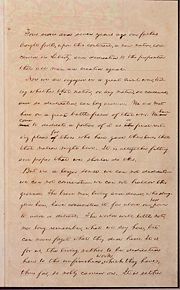
The existence of the Hay Copy was first announced to the public in 1906, after the search for the "original manuscript" of the Address among the papers of John Hay brought it to light. Significantly, it differs markedly from the manuscript of the Address described by John Hay in his article, and contains numerous omissions and inserts in Lincoln's own hand, including omissions critical to the basic meaning of the sentence, not simply words that would be added by Lincoln to strengthen or clarify their meaning.
This version has been described as "the most inexplicable" of the drafts and is sometimes referred to as the "second draft." The "Hay Copy" was made either on the morning of the delivery of the Address, or shortly after Lincoln's return to Washington. Those that believe that it was completed on the morning of his address point to the fact that it contains certain phrases that are not in the first draft but are in the reports of the address as delivered and in subsequent copies made by Lincoln. It is probable, they conclude, that, as stated in the explanatory note accompanying the original copies of the first and second drafts in the Library of Congress, Lincoln held this second draft when he delivered the address. Lincoln eventually gave this copy to his other personal secretary, John Hay, whose descendants donated both it and the Nicolay Copy to the Library of Congress in 1916.
Everett Copy
The Everett Copy, also known as the "Everett-Keyes Copy," was sent by President Lincoln to Edward Everett in early 1864, at Everett's request. Everett was collecting the speeches at the Gettysburg dedication into one bound volume to sell for the benefit of stricken soldiers at New York's Sanitary Commission Fair. The draft Lincoln sent became the third autograph copy, and is now in the possession of the Illinois State Historical Library in Springfield, Illinois, where it is currently on display in the Treasures Gallery of the Abraham Lincoln Presidential Library and Museum.
Bancroft Copy
The Bancroft Copy of the Gettysburg Address was written out by President Lincoln in February 1864 at the request of George Bancroft, the famed historian and former Secretary of the Navy whose comprehensive ten volume History of the United States later led him to be known as the "father of American History." Bancroft planned to include this copy in Autograph Leaves of Our Country's Authors, which he planned to sell at a Soldiers' and Sailors' Sanitary Fair in Baltimore. As this fourth copy was written on both sides of the paper, it proved unusable for this purpose, and Bancroft was allowed to keep it. This manuscript is the only one accompanied both by a letter from Lincoln transmitting the manuscript and by the original envelope addressed and franked by Lincoln. This copy remained in the Bancroft family for many years, was sold to various dealers and purchased by Nicholas and Marguerite Lilly Noyes, who donated the manuscript to Cornell in 1949. It is now held by the Division of Rare and Manuscript Collections in the Carl A. Kroch Library at Cornell University. It is the only one of the five copies to be privately owned.
Bliss Copy
Discovering that his fourth written copy could not be used, Lincoln then wrote a fifth draft, which was accepted for the purpose requested. The Bliss Copy, named for Colonel Alexander Bliss, Bancroft's stepson and publisher of Autograph Leaves, is the only draft to which Lincoln affixed his signature. Lincoln is not known to have made any further copies of the Gettysburg Address. Because of the apparent care in its preparation, and in part because Lincoln provided a title and signed and dated this copy, it has become the standard version of the address and the source for most facsimile reproductions of Lincoln's Gettysburg Address.
This draft now hangs in the Lincoln Room of the White House, a gift of Oscar B. Cintas, former Cuban Ambassador to the United States. Cintas, a wealthy collector of art and manuscripts, purchased the Bliss Copy at a public auction in 1949 for $54,000, at that time the highest price ever paid for a document at public auction. Cintas' properties were claimed by the Castro government after the Cuban Revolution in 1959, but Cintas, who died in 1957, willed the Gettysburg Address to the American people, provided it would be kept at the White House, where it was transferred in 1959.
Garry Wills concluded the Bliss Copy "is stylistically preferable to others in one significant way: Lincoln removed 'here' from 'that cause for which they (here) gave...' The seventh 'here' is in all other versions of the speech." Wills noted the fact that Lincoln "was still making such improvements," suggesting Lincoln was more concerned with a perfected text than with an 'original' one.
Legacy
The importance of the Gettysburg Address in the history of the United States is underscored by its enduring presence in American culture. In addition to its prominent place carved into a stone cella on the south wall of the Lincoln Memorial in Washington, D.C., the Gettysburg Address is frequently referred to in works of popular culture, with the implicit expectation that contemporary audiences will be familiar with Lincoln's words.
In the many generations that have passed since the Address, it has remained among the most famous speeches in American history. Lincoln's Gettysburg Address is itself referenced in another of those famed orations, Martin Luther King, Jr.'s " I Have a Dream" speech. Standing on the steps of the Lincoln Memorial in August 1963, King began with a reference to President Lincoln and his enduring words: "Five score years ago, a great American, in whose symbolic shadow we stand today, signed the Emancipation Proclamation. This momentous decree came as a great beacon light of hope to millions of Negro slaves who had been seared in the flames of withering injustice."
The Constitution of France (under the present Fifth Republic) states that the principle of the Republic of France is "gouvernement du peuple, par le peuple et pour le peuple" ("government of the people, by the people, and for the people,") a literal translation of Lincoln's words.
This fame is somewhat ironic, for Lincoln clearly states that he expects that "the world will little note, nor long remember what we say here."
